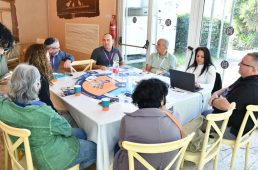It is worthwhile to start the post-retirement journey with a positive view of what we have already accomplished in our lives, and to look forward with a sober eye regarding our consumer and economic conduct.
In a survey conducted about three years ago, about half of the respondents, senior citizens in Israel, reported that the ability of a household to manage financially ranged from a degree of difficulty to great difficulty. This figure takes on additional significance in light of the fact that Israel’s population is expected to age considerably in the coming decades, and the number of elderly aged 70 and over is expected to double from 610,000 men and women to about 1.24 million by 2035 (Taub Center, May 2017).
In fact, retirement is the first period in our lives in which we live without a framework, which to a large extent defined our identity, after kindergarten, school,
The army, studies, training and employment, and the workplace. Therefore, we must build a future plan for ourselves, according to our needs and desires. It is a new era of life, in which social, health and economic challenges are changing.
So how do we live with goodness and dignity with what we have while exercising the rights granted to us as senior citizens?
It’s something you have to learn to do….
“The Magic Number” – Building a Budget and Future Planning
The guiding principle, which should guide us, is: “Life from what is”! Later I will present the practical way to reach the “magic number” – the number that expresses the amount of monthly money we need in order to live at the level we want, each and every one according to what he defines for himself and according to the right priorities for him/her/couple.
mirroring
In the first stage, in order for us to “know where we live,” we must map all our monthly income and expenses in an orderly manner (bills for food, fuel, communications, entertainment, medical expenses, child assistance, debt repayments, etc.). You can download forms for registering income and expenses After filling out the forms, you will receive a picture of the situation that reflected our financial conduct. This is actually the “magic number” – how much money we need for living. At the same time, we will be able to see how much we control our spending. Are we balanced? That is, income is similar to expenses, is there a negative gap? In other words, his expenses are higher than income or is there a positive gap, i.e. our income is higher than expenses, which leaves us free money for saving for the future/for unexpected things.
Prioritize
The next step is designed in case there is a negative gap between expenses and income – more expenses than income. In that case, we would have to narrow the gap by cutting spending according to priorities in each section. The couple must sit together and decide which items can be cut and where it is impossible.
budget
At this stage, we will plan a budget by determining the amount of expenditure in each section. We are our own “finance ministers,” and if we have completed the monthly allocation to a certain item, we will manage the budget transfers between the items without deviating from the framework budget. If there are still committed expenses, and we have nowhere to cover them, it will be necessary to increase revenue. We must conduct monthly control of actual expenditures vis-à-vis the budget and correct the conduct or update the budget according to changing needs.
Future planning
Some of our future expenses are predictable. For example: current bills, renovations, travel, car treatments, car upgrades, family celebrations, but it is important to prepare budgetarily for unexpected expenses, such as repairing a refrigerator / washing machine / car and therefore it is recommended to allocate an additional 5% to this in the monthly family budget. It is worthwhile to prepare with reserves also for future expenses, which are related to the possibility of a decline in the state of health: nursing assistance, assistive medical devices, renovation for the purpose of adjusting the apartment, assisted living. For this purpose, it is recommended to obtain appropriate long-term care insurance.
Asset Concentration Portfolio
For the sake of good order in our lives and even after 120 years, it is worthwhile to prepare the portfolio of asset concentration that will include:
- Details of bank accounts (checking accounts, foreign currency, savings, securities).
- Medical topics: HMO, family doctor, private medical insurance, personal accident insurance, long-term care insurance.
- Savings for the future: life/executive insurance, pension savings products, study funds) Forgotten savings can be located with the help of the Ministry of Finance’s “Money Mountain” website.
- Home, car and other insurance policies can be assisted by the Capital Market Authority’s “Insurance Mountain” website according to an ID number.
- Real estate: address and additional information.
- Treating attorney: will, conditional guardianship.
Economic boundaries with the family
A survey conducted about a year ago among a representative sample of 800 parents and their adult children from all walks of life reveals that 87% of parents provide their adult children and those with families who have left home financial assistance every month. 66% of parents regularly help their children every month for an average sum of NIS 2,100 (NIS 25,200 per year). 25% of the parents in the sample provide financial assistance through supermarket shopping, expenses for their grandchildren (classes, clothes), overdraft coverage at the bank or participation in rent/mortgage. 76% of parents help their children with large one-time expenses (buying an apartment/car/renovation). The total financial assistance of parents per year (monthly and one-time) amounts to an average of NIS 90,000.
Half of the parents note that helping their adult children has moderate to great harm to their financial well-being. A great moral, emotional and economic question lies before us in the third age. On the one hand, the “parental task” – who doesn’t want to help their children “get along”/”get on their feet”? On the other hand, is it right to spare ourselves what we need? Is it right to help our children today and in the future to help them?
Some thoughts on the possibilities of dealing with the matter
- Giving is a right rather than an obligation; Love and appreciation don’t buy with money
- Give – to the extent that suits you and transparently.
- Don’t give up on your needs. Being a victim is not contributing. You must take care of yourself in the present and in the future, so that you do not fall into a burden on the children. We want them by our side until 120.
The consumer dimension
We live in a consumerist Western society, which encourages, through aggressive marketing to which we are exposed by every possible means, to consume more and more. Usually, these are things that we usually have no real need for. As Tim Jackson, former economics director at the UK government’s Sustainable Development Committee, put it: “We’re being persuaded to spend money we don’t have, for things we don’t need, for people we don’t care so much about.”
This may be how the national economy and GDP indices rise, but is there really a change for the better in our individual and national happiness indices with the increase in consumption? Is this a planned purchase, made after consideration within our budgetary priorities? It is important to remember that upon retirement, our income decreases. So what advertisers think about the elderly: “The advantages in this segment are many: they have a lot of free time, a lot of free money, their life expectancy has increased greatly over the years, they are significant consumers of media on television, radio and even digital.”
So how do we become intelligent consumers?
- Not everything you “want” really “needs”: separate fixed needs (anything essential to our physical or mental well-being) from changing desires.
- Compare prices (there are price comparison sites), be assertive with the various providers (cellular, TV, Internet, newspapers, banks…).
- It’s a good idea to check your bills once every six months and check if there are any promotions.
- There is no obligation to be a member of various customer clubs despite the apparent beauty of a wallet that opens with a variety of colorful cards. Belonging to a “club” will prevent you, as a consumer, from investing in price comparisons under the mistaken assumption that the club you are a member of is “always with you” at the low price.
- Exercise your rights as a senior citizen (the rights booklet will be sent to you upon receipt of a senior citizen certificate or by contacting the 8840 hotline).
- Beware of telemarketing when the details of the transaction are not fully clear to you. Know the details of the transaction, including the fine print. If you have concerns about the transaction or are under pressure to sign/redeem it, stop! You can request that the offer be sent to you by email or fax, so that you can review it thoroughly and ask them to get back to you at a later date. The Contracts Law allows cancellation of a transaction/contract made fraudulently or out of exploitation of weakness.
- It is useful to document conversations with service representatives by phone (representative name, date, amount and agreed conditions).
- It is possible and worthwhile to consult with family members who are more proficient in technology and dealing with the various service providers and institutions.
How do we save on the supermarket?
- Products at hand and eye level are usually more expensive than comparable products on the bottom/top shelf.
- Don’t be tempted by deals at checkout: if you needed the product, it would be on your list and in your shopping cart. Not always the promotions
It is worthwhile and sometimes it is a product that will expire soon (a trio of pasta / couscous two weeks before Passover on sale). - Note: Generally, the household product (not the brand) is cheaper.
- Come with a list and don’t come hungry for shopping.
- Check your invoice. Sometimes there is no correlation between what is advertised on the shelf with a discount and what the cashier printed.
How do we save on electricity bills?
- In the next period of life, we are more at home and therefore use heating/cooling more. Make sure to turn on the air conditioners
In energy-saving programs (24 degrees Celsius in summer and 20 degrees Celsius in winter). - If you are buying a new appliance – make sure to have a good energy rating.
- Use a timer for the electric boiler.
- Turn off appliances – Standby mode still consumes power.
- Use energy-saving light bulbs.
- Senior citizens, recipients of income support from the National Insurance Institute, are entitled to a 50% discount for the first 400 kWh each month (Application
to 103)
How do we save water?
- Using “savings” saves one-third of your average daily value.
- It is recommended to install in the flushing tanks in the toilet the possibility of flushing half the tank.
- Senior citizens who receive income support from the National Insurance Institute (or Long-Term Care Benefit) are entitled to an additional 3.5 cubic meters per month at the lower rate.
Medical Services & Medications
- From the age of 65, there is a 50% reduction in the quarterly ceiling for institutes and visits to professional doctors (contact the health plan service centers
the patients if the reduction was not received). - Assistance in purchasing hearing aids for people aged 65+ by the HMOs.
- 10% discount on co-payments and medication purchases for HMO members over the age of 72.
How do we save on car/transportation expenses?
- Driving calmly at a reasonable speed, with tires filled with air as required and with a trunk not cluttered with unnecessary things, can save between 15% and 30% on fuel costs.
- Compulsory insurance rates can be compared in the Capital Market Authority calculator.
- Walking is healthier and saves parking fees.
- The “Senior Citizen” certificate, issued by the Ministry of Social Equality, grants a 50% discount on fares on public transportation (buses, trains, light rail in Jerusalem).
Banking Services
- Check entitlements and benefits in the senior citizen account tracks.
- Consolidate and negotiate bank accounts to save on fees and interest.
- Loans: Check carefully if you really need to and what your repayment capacity is.
- Reduce credit cards.
- Arnona discount – local authorities grant a Arnona discount to senior citizens (25%-100%) according to income tests. Implementation through a signed written application to the local authority.
Discount on leisure consumerism
- Senior citizens are entitled to a 50% discount on entrance to museums, tourist sites and performances in many theaters in Israel, for example: the Israel Museum, Tel Aviv Museum, Haifa Science Museum, Israel Museum, the Cameri, Haifa Theater, Be’er Sheva Theater, Nature and Parks Authority.
- Always present your senior citizen card (also abroad) and check whether you are eligible for a discount.
- Don’t leave an envelope closed! You have received a bill in the mail from any service provider – open and check that there are no unusual charges.
- See if you can reduce handling fees and various fees.
- Who should I contact in case of dissatisfaction/failure with the service? The company’s customer service, the Consumer Council, the Consumer Protection Authority, the “Public Trust”, the Ombudsman in the State Comptroller’s Office.
Action Plan
- Building a budget and acting according to it.
- Preparation of an asset concentration portfolio.
- Balanced and measured consumer conduct.
- Updating the economic boundaries with and vis-à-vis the family.
- Make an appointment with your insurance agent/pension advisor to know what you have.
- Exercising the rights of a “senior citizen” – contacting the authorities to receive the discounts you deserve. You can use the Kol Zchut website at the hotline
For senior citizens *8840, in power centers, atShil (Citizen Counseling Service). - A choice between employment, entrepreneurship and volunteering or all three or two of them… And don’t forget to leave time for yourself and family!



